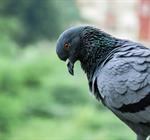
28 Mar 2024 | Apex Environmental Services (UK) Ltd
4 Natural Bird Repellent: DIY Home Remedies
While birds make up an important part of the ecosystem, their presence can sometimes pose challenges for homeowners and gardeners. From the incessant chirping early in the morning to the potential harm they can cause to crops and structures, finding humane and natural ways to repel these winged visitors is often a priority. In this guide, we're going to explore 4 Natural Bird Repellent: DIY Home Remedies that are not only effective, but also safe for the environment.
So whether you're dealing with sparrows, pigeons, or any other bird species, these home remedies offer safe alternatives for bird control, aligning with methods that consider the well-being of both the birds and your home. Let’s take a look.
What is a Natural Bird Repellent?
Definition of Natural Bird Repellents
Natural bird repellents are substances or methods used to deter birds from certain areas without causing them harm; these can range from homemade sprays to physical deterrents, all designed to keep birds at bay in a humane manner.
Benefits of Natural Repellents
Opting for natural solutions offers several advantages; not only are they environmentally friendly, but they're also safe for use around children and pets. Moreover, they provide a cost-effective alternative to commercial products, with many ingredients likely already in your pantry.
Common Ingredients for DIY Bird Repellents
Peppermint Oil Spray
Peppermint oil is known for its strong aroma, which birds find unpleasant. Mixing a few drops of peppermint oil with water and a small amount of dish soap can create an effective spray to keep birds away from desired areas.
Chili Pepper Solutions
Capsaicin, the compound that gives chilli peppers their heat, is an excellent bird deterrent. Creating a solution of water, chilli pepper, and vinegar can help repel birds from gardens without harming them.
Vinegar Mixtures

Vinegar's strong scent can also deter birds; a diluted vinegar solution can be sprayed around the perimeter of your property to keep birds from landing and nesting.
Reflective Surfaces
Birds are naturally deterred by bright, reflective surfaces, which means that hanging CDs, aluminium foil, or special reflective tapes can scare birds away. Affordable and easy to execute, this natural method offers a simple yet effective solution.
Application and Usage Tips
Proper Application Techniques
For sprays, it's important to reapply after rainfall and on a regular basis to maintain efficacy. You’ll also want to ensure that the solutions are applied during dry weather to allow them to set and become more effective.
Targeted Areas
Focus on areas where birds are most problematic, such as gardens, roofs, or balconies. By targeting these areas, you can prevent damage and nuisance without affecting birds' natural behaviours elsewhere.
Considering Environmental Impact
In the quest to protect our homes and gardens, it's also important to consider the broader environmental impact of our choices. Natural bird repellents ensure that we're not only solving a personal issue but also contributing positively to the ecosystem; these methods discourage birds without harm, promoting coexistence rather than conflict.
The Bottom Line
Ultimately, embracing natural bird repellent methods is a step towards a more harmonious relationship with our feathered friends. By using the DIY home remedies outlined above, you can effectively keep unwanted birds at bay while ensuring the safety and health of all involved.
For those looking for more comprehensive and effective anti-bird solutions, exploring professional options like anti-bird netting can offer additional peace of mind and protection. Whether you're a seasoned gardener or simply looking to maintain a bird-free balcony, these natural solutions offer a responsible and effective way to manage your space.


